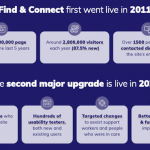Promoting the Principles
- Jun 15, 2016
- In Events

Wattle Place hosts a regular interagency meeting of services in the Sydney area who hold care records. At one of our recent meetings we invited Barbara Reed of Recordkeeping Innovation to speak about her work with the Department of Social Services and the creation of the Access to Records by Forgotten Australians and Former Child Migrants: access principles for records holders, best practice guidelines in providing access to records document which was adopted by DSS at the beginning of 2016 – see earlier blog post New Principles for Access to Records.
Whilst the document was primarily aimed at government record holding departments we were keen to provide further information about the Principles and Guidelines to the various non-government organisations that attend our meeting as our experience shows that different agencies provide copies of their care records is very different ways – for example, some agencies interpret the third party privacy laws much more stringently than others, the redaction* of information is inconsistent and the requirements to provide identification documents vary enormously.
It was very pleasing to see that the Barbara’s presentation was very well received and that all the attendees felt that having some firm guidelines regarding what constitutes ‘personal information’ was very helpful. It was apparent that the records access principles were welcomed by these agencies and it is hoped that these organisations will also adopt the Access Principles in the future so that more care leavers can be provided with a consistent approach in regard to access to their records.
* Redaction is the process of removing information from view, usually by blocking out the information on a copy and recopying that changed document. (Access to Records by Forgotten Australians and Former Child Migrants, p.30)
Author: Jeremy Palmer
Jeremy Palmer works for Relationships Australia as the Records Management Officer for the Find and Connect Service in New South Wales. His role involves working with Forgotten Australians to find their care records from children’s homes and other institutions as well as tracing their relatives and lost family members.






Frank Golding
July 1, 2016 10:32 amSpot on Graham Hercus!
Graham Hercus
June 15, 2016 5:01 pmThe tension created between the past provider organisation and the care leaver when information is redacted has, in my experience, the plainly damaging effect of a) re-abusing the abused as well as b) turning the organisation who was guilty of historical abuse, once again, into a modern abuser.
Any past provider, especially those that have had their history of hiding abuse exposed publicly, who wants to show that they have turned away from their past behaviour has a hugely increased credibility problem when they then seek to limit what the care leaver is allowed to see.
Unlike NSW FaCCS and some other NGO past providers, who adhere to a limited, politically correct, policy concerning what people can be trusted to see about themselves and their family, our organisation and some others takes the view that we have no right to edit what adults can see on papers that relate to what people were saying about them or their family when they were children.
As Jeremy noted, Barbara Reed’s approach was a breath of fresh air after the almost sanctimonious approach of others who felt that care leavers couldn’t be trusted with their information. Bravo!